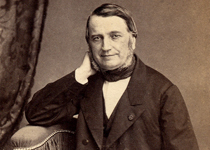Dominique Alexandre Godron

Dominique Alexandre Godron (March 25, 1807 - August 16, 1880) was a French physician and botanist born in the town of Hayange, in the département Moselle.
Godron studied medicine at the University of Strasbourg, and during his career distinguished himself in natural sciences as well as in the field of medicine. In 1854 he became dean and professor of natural history to the Faculty of Sciences at Nancy. Here he established a natural history museum and reorganized its botanical garden (now the Jardin Dominique Alexandre Godron, renamed in his honor).
Among his numerous writings were a publication on the flora of the Lorraine region of France called "Flore de Lorraine" (1843), and the three-volume "Flore de France", a work on flora native to France and Corsica that was co-written with botanist Jean Charles Marie Grenier (1808-1875). In addition to his botanical works, he published a number of studies in the field of ethnology.[1]
Before Mendel, he discovered the main features of hybridation. In "de l'Espece et des races dans les êtres organises" he also demonstrated that hybridization in the vegetal world was, against the dominant thinking at the time, similar to hybridization in the animal world. He finally demonstrated the unity of mankind in his book dedicated to our specie.
References
- Biography of Dominique Alexandre Godron (translated from French).
- ^ IDREF.fr (extensive bibliography of Godron]
- ^ International Plant Names Index. Godr.
